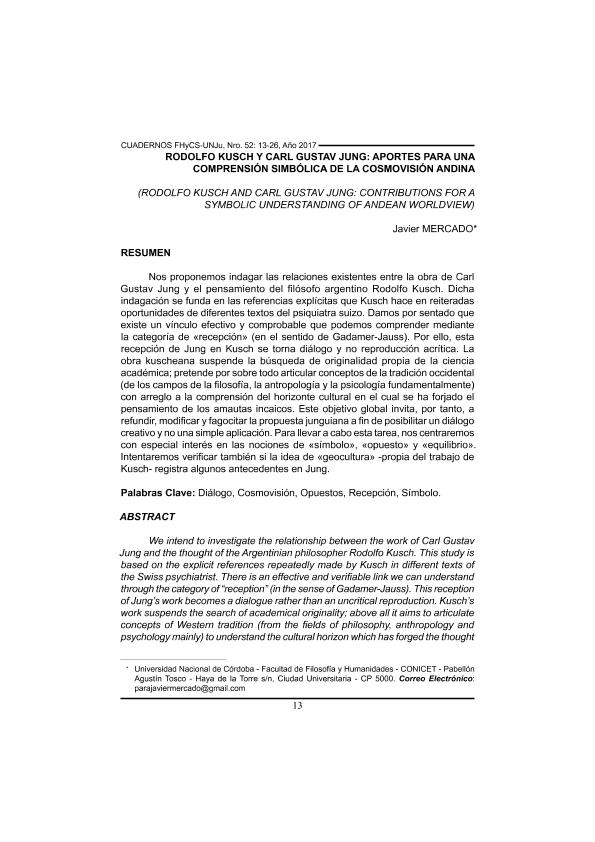Mostrar el registro sencillo del ítem
dc.contributor.author
Mercado, Javier

dc.date.available
2019-08-05T17:24:18Z
dc.date.issued
2017-04
dc.identifier.citation
Mercado, Javier; Rodolfo Kusch y Carl Gustav Jung: aportes para una comprensión simbólica de la cosmovisión andina; Universidad Nacional de Jujuy. Facultad de Humanidades y Ciencias Sociales; Cuadernos de la Facultad de Humanidades y Ciencias Sociales; 52; 4-2017; 13-26
dc.identifier.issn
0327-1471
dc.identifier.uri
http://hdl.handle.net/11336/80909
dc.description.abstract
Nos proponemos indagar las relaciones existentes entre la obra de Carl Gustav Jung y el pensamiento del filósofo argentino Rodolfo Kusch. Dicha indagación se funda en las referencias explícitas que Kusch hace en reiteradas oportunidades de diferentes textos del psiquiatra suizo. Damos por sentado que existe un vínculo efectivo y comprobable que podemos comprender mediante la categoría de «recepción» (en el sentido de Gadamer-Jauss). Por ello, esta recepción de Jung en Kusch se torna diálogo y no reproducción acrítica. La obra kuscheana suspende la búsqueda de originalidad propia de la ciencia académica; pretende por sobre todo articular conceptos de la tradición occidental (de los campos de la filosofía, la antropología y la psicología fundamentalmente) con arreglo a la comprensión del horizonte cultural en el cual se ha forjado el pensamiento de los amautas incaicos. Este objetivo global invita, por tanto, a refundir, modificar y fagocitar la propuesta junguiana a fin de posibilitar un diálogo creativo y no una simple aplicación. Para llevar a cabo esta tarea, nos centraremos con especial interés en las nociones de «símbolo», «opuesto» y «equilibrio». Intentaremos verificar también si la idea de «geocultura» -propia del trabajo de Kusch- registra algunos antecedentes en Jung.
dc.description.abstract
We intend to investigate the relationship between the work of Carl Gustav Jung and the thought of the Argentinian philosopher Rodolfo Kusch. This study is based on the explicit references repeatedly made by Kusch in different texts of the Swiss psychiatrist. There is an effective and verifiable link we can understand through the category of “reception” (in the sense of Gadamer-Jauss). This reception of Jung’s work becomes a dialogue rather than an un critical reproduction. Kusch’s work suspends the search of academical originality; above all it aims to articulate concepts of Western tradition (from the fields of philosophy, anthropology and psychology mainly) to understand the cultural horizon which has forged the thought of the amautas. This global objective invites to consolidate, modify and engulf the Jungian approach to build a creative dialogue but not a mere application. To accomplish this task, we’ll focus with special emphasis on the notions of “symbol”, “opposite” and “balance”; and also we’ll try to see if the idea of “geoculture” -a main category of Kusch’s thought- has some background in Jung’s work.
dc.format
application/pdf
dc.language.iso
spa
dc.publisher
Universidad Nacional de Jujuy. Facultad de Humanidades y Ciencias Sociales

dc.rights
info:eu-repo/semantics/openAccess
dc.rights.uri
https://creativecommons.org/licenses/by-nc-sa/2.5/ar/
dc.subject
Diálogo
dc.subject
Cosmovisión
dc.subject
Opuestos
dc.subject
Recepción
dc.subject.classification
Estudios Religiosos

dc.subject.classification
Filosofía, Ética y Religión

dc.subject.classification
HUMANIDADES

dc.title
Rodolfo Kusch y Carl Gustav Jung: aportes para una comprensión simbólica de la cosmovisión andina
dc.title
Rodolfo Kusch and Carl Gustav Jung: Contributions for a symbolic understanding of andean worldview
dc.type
info:eu-repo/semantics/article
dc.type
info:ar-repo/semantics/artículo
dc.type
info:eu-repo/semantics/publishedVersion
dc.date.updated
2019-05-23T14:46:58Z
dc.identifier.eissn
1668-8104
dc.journal.number
52
dc.journal.pagination
13-26
dc.journal.pais
Argentina

dc.journal.ciudad
San Salvador de Jujuy
dc.description.fil
Fil: Mercado, Javier. Universidad Nacional de Córdoba. Facultad de Filosofía y Humanidades. Centro de Investigaciones María Saleme Burnichón; Argentina. Consejo Nacional de Investigaciones Científicas y Técnicas. Centro Científico Tecnológico Conicet - Córdoba; Argentina
dc.journal.title
Cuadernos de la Facultad de Humanidades y Ciencias Sociales

dc.relation.alternativeid
info:eu-repo/semantics/altIdentifier/url/http://ref.scielo.org/dbf6pt
Archivos asociados
